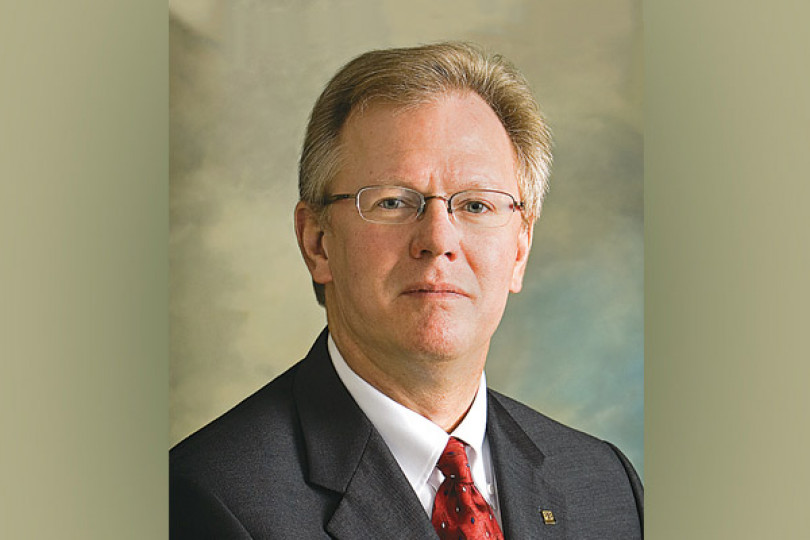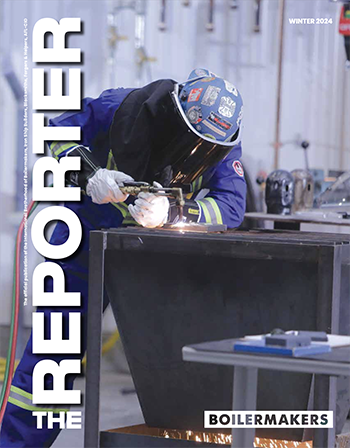The affiliation between the Boilermakers and the Utility Workers Union of America and the Brotherhood’s M.O.R.E. Work Investment Fund are smart, bold strategies for dealing with the realities we face.
Stronger ties with UWUA, national launch of M.O.R.E. Work program bring opportunities for growth
TWO MAJOR INITIATIVES involving our Brotherhood are moving our union forward, positioning us for growth and a more secure future. They include an historic affiliation between the Boilermakers and the Utility Workers Union of America (UWUA) and the national launch of our M.O.R.E. Work Investment Fund.
On May 8, the Boilermakers and the Utility Workers signed an affiliation agreement that formally recognizes our intention to work together for the mutual benefit of our two organizations. Essentially, this means that, where it makes sense to do so, we may share resources in the pursuit of our common goals. While the details are still to be worked out, this could involve the sharing of training facilities, programs and staff; working collectively on legislative issues; cross-matching members to fill job vacancies; and other forms of collaboration.
The Utility Workers are similar to the Boilermakers in size and in other respects. They work extensively in the utility industry, operating power plants as well as natural gas and water facilities. UWUA members also work in call centers and in professional technical positions. Many UWUA members have skill sets that are similar to those of construction Boilermakers and have completed apprenticeship training.
Like the Boilermakers, the Utility Workers have a strong legacy of member representation and have developed quality safety programs and healthcare and pension benefits to support workers and their families.
Like the Boilermakers, the Utility Workers have been impacted by coal plant closures and the shift to natural gas plants and renewable forms of energy. Our International leadership and that of the UWUA are taking a close look at how we may secure work in the renewable energy field and in other non-traditional industries where our members’ skills can be applied, as well as expanding our opportunities in industries where we already have a substantial presence.
We also share a belief that carbon capture technologies must be an essential component of any national energy policy so that fossil fuels may continue to be used in a responsible way while preserving jobs in the industries that rely on those fuels.
Our relationship with the Utility Workers has grown strong over the years. UWUA National President Mike Langford and National Executive Vice President Steven VanSlooten both participate in our conferences and both serve on the board of Bank of Labor. Our affiliation with the UWUA is built on mutual trust and an awareness of our mutual goals and needs.
As we pursue our affiliation with the Utility Workers, we are also moving forward with our national roll-out of the M.O.R.E. (Marketing, Organizing, Recruitment, Employment) Work Investment Fund. This effort is gaining strength and producing impressive results.
As previously reported, the M.O.R.E. Work program concept was successfully piloted in California. Together with the State Building and Construction Trades Council of California, the Boilermakers helped push through groundbreaking legislation requiring that 60 percent of contractor refinery workers be journeymen who have graduated from a state or federally approved apprenticeship program. The resulting law has led to dozens of contractors becoming signatory to Boilermaker agreements and to hundreds of new members joining our union in the Western States. Boilermakers and other union trades are now benefitting from millions of man-hours of maintenance work in California refineries.
Building on the success in California and using it as a model, we lobbied for similar legislation in the state of Washington and again succeeded, along with the Washington State Building Trades, in getting a bill passed that requires the use of skilled trades, both in the petroleum refining industry as well as in chemical manufacturing. The Washington state bill was signed by Governor Jay Inslee on May 8, with IVP-WS J. Tom Baca, local lodge leaders and International staff present at the event. The new law could generate between one and two million additional man-hours of work for Boilermakers.
These impressive victories on the West Coast are just the beginning, as we gear up the M.O.R.E. Work Investment Fund across all four U.S. Vice Presidential Sections. A similar lobbying effort is underway in Illinois, funded on our part by Construction Sector members in the Great Lakes IVP Section and supported by the Illinois AFL-CIO. Martin Williams National Coordinator of State Legislative Affairs for the M.O.R.E. Work program, reported that SB 1407 passed the Illinois Senate May 23 and the Illinois House Labor Committee a few days later. The legislation is expected to come up again in the Illinois General Assembly’s fall session. The bill would require contractors to use workers with skilled training in refineries as well as in ethanol and petrochemical manufacturing industries. We estimate that if the bill becomes law, 650,000 additional man-hours of work could become available to our members.
We are also moving forward under the M.O.R.E. Work program with marketing, organizing and recruitment efforts — and these are showing positive results. Through the M.O.R.E. Work Investment Fund, we are now able to more aggressively advertise the Boilermaker advantage and to reach out to more potential customers. More resources allow us to pursue market recovery measures, to identify and seek out owners that may have used Boilermakers in the past but no longer do so. More resources allow us to be more competitive in situations where our contractors might otherwise be discouraged from bidding on projects. More resources allow us to build new training centers to ensure our members maintain a competitive edge. And more resources enable us to hire more organizers to build our membership.
Growing our membership is essential to ensure we can fully staff all available work — and not lose jobs to nonunion workers or other crafts. It is also essential to restore the Boilermaker-Blacksmith National Pension Trust to its full health by increasing the contributions that come with more man-hours.
Without question, we have faced some extraordinary challenges in recent years with the shift away from coal-fired plants, the Great Recession’s impact on our pension, and large numbers of baby boomers retiring. These things have certainly stressed our union, our members and our families.
Challenging times require fresh approaches. The affiliation between the Boilermakers and the Utility Workers Union of America and the Brotherhood’s M.O.R.E. Work Investment Fund are smart, bold strategies for dealing with the realities we face. I believe we will continue to see positive, measurable progress as these strategies develop further.
I want to thank our members for supporting these vital initiatives.






